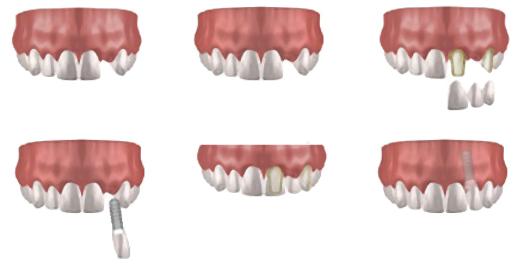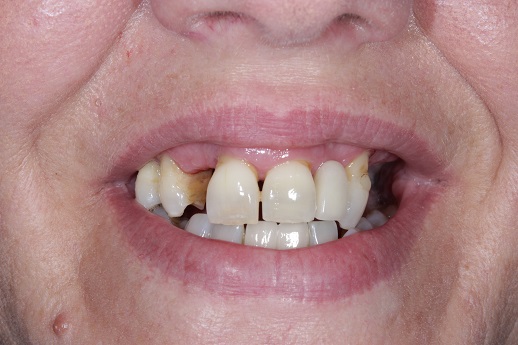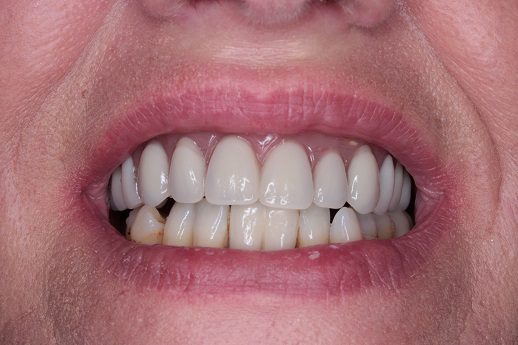Implants at the Solihull Dental Centre and Implant Clinic

Dr Zubair Sacranie has had many years of experience in restoring teeth with implants and has a number of postgraduate qualifications in this field. Dr Sacranie has numerous implant cases referred to him from other general dental practitioners in the West Midlands. Please do read the following description of dental Implants. These are general descriptions regarding the treatment. If you are considering having dental implants we advise you to make an appointment for an implant consultation with Dr Sacranie who will be able to advise you whether this treatment is appropriate for you, and to discuss the treatment planning of the surgical procedure.
Dental implants are the most sophisticated and effective long-term solution to replace missing teeth, and can remove the need for dentures or dental bridges.
Single tooth replacements

Dental implants are essentially small titanium screws that are fixed into the jawbone, which act like the root of a natural tooth. An even smaller titanium extension is secured to the implant and a dental crown (or tooth cap) is secured over the dental implant. This dental crown can be made of robust porcelain or ceramic and is matched to the colour of your natural teeth.
Before and after pictures for a patient treated with Implants by Zubair Sacranie and by Clinical Dental Technician Kevin Thomas.

before dental implant treatment

after dental implant treatment
![]() I recently had implant surgery at Solihull Dental Centre and Implant Clinic. Through every step of the procedure I found everyone at the centre professional, efficient and very caring. Each time I visited I found everyone friendly and reassuring. In particular I would like to thank my dental surgeon, Dr Zubair Sacranie, and Kevin Thomas the Clinical Dental Technician; throughout the course of my treatment they explained every step clearly so I knew what to expect. I am delighted with the results and would gladly recommend the Dental Centre
I recently had implant surgery at Solihull Dental Centre and Implant Clinic. Through every step of the procedure I found everyone at the centre professional, efficient and very caring. Each time I visited I found everyone friendly and reassuring. In particular I would like to thank my dental surgeon, Dr Zubair Sacranie, and Kevin Thomas the Clinical Dental Technician; throughout the course of my treatment they explained every step clearly so I knew what to expect. I am delighted with the results and would gladly recommend the Dental Centre ![]()
Your dentist may give you some pain relief after the surgery, or check whether you have them at home to take over the next few days if you need them. Your dentist may also prescribe antibiotics. Dont smoke, exercise or drive for the rest of the day. Dont rinse the area and only eat soft foods. However, it is important that you keep your mouth clean by brushing but do not poke the implant site. You can use a chlorhexidine mouthwash every day during the first week after surgery (you can get these from supermarkets and chemists).
Implants for teeth are a well-established, tried-and-tested treatment. 95 per cent of modern implants should last for many years with the right care.
Yes. You can have any number of teeth replaced with implants – from one single tooth to a complete set. there may however be certain clinical situations where a dental implant is not suited, we will let you know at the initial consultation if you may be affected by this.
 A special report by Dr Zubair Sacranie revealing what everyone should know about replacing missing teeth.
A special report by Dr Zubair Sacranie revealing what everyone should know about replacing missing teeth.
Take your first step to replacing missing teeth and download my free guide today.
Placing the implants requires a small operation. This can be done using a simple local anaesthetic, and sometimes with sedation if you are very nervous. Sometimes the dentist needs to use a general anaesthetic for complex cases. You will not feel any pain at the time, but you may feel some discomfort during the week after the surgery. This is usually due to having stitches, and the normal healing process.
Your dentist will be able to give you a rough timetable before the treatment starts. Usually the permanent teeth are fitted 6 to 9 months after the implants are put in, but many implant systems now allow the time to be as short as 3 months. Some teeth can now even be fitted at the same time as the implants (known as immediate implants) but you should check with your dentist to see whether these are suitable for you.
The implants need to bond (integrate) with the bone after they have been put in. This takes at least 3 months in the lower jaw and 6 months in the upper jaw.
Sometimes the implants may be stable enough when they are fitted for the artificial teeth to be attached much sooner than this.
If you are having one, two or three teeth replaced, you will have a temporary restoration in the meantime. If you have complete dentures, then these can be worn throughout the healing period once they have been modified after the surgery.
No. But after care is important if you are going to have a long-lasting, successful implant. Your dentist should give you detailed advice on how to look after your implants. Cleaning around the teeth attached to the implants is no more difficult than cleaning natural teeth. However, there may be areas that are difficult to reach and youll be shown methods to help you. You may need to visit your hygienist more often but your dentist will be able to talk to you about this.
Most artificial teeth attached to implants can only be placed and removed by the dentist. However, if you have complete dentures fixed to the implants by bars, then you'll be able to take them out for cleaning.
Your dentist will make sure that the implants won't show during all normal movements of the mouth and lips. You will need to be able to see them, so that you can clean them properly.
No, unless you're only having a single tooth replaced. Normally, five or six implants are used to replace all the teeth in one jaw, as each implant can usually support two teeth. For a few missing teeth, two or three implants may be used.
Your Implanologist will be able to provide you with a written estimate of cost. However, over the longer term, implants are usually a more cost-effective and satisfactory option. There are advantages to it, too. An implant to replace a single tooth avoids the need to cut down the teeth either side for crowns to support a bridge. Normal dentures often mean you can't eat or speak well, due to the dentures moving about. But teeth attached to an implant don't cause this problem as they are anchored to the bone more firmly than natural teeth.
Talk to your dentist, so you can be referred to a specialist for assessment and treatment, we are happy to accept referrals from general dentists in the Solihull, Sutton Coldfield, Birmingham and Stratford-upon-Avon areas. Your dentist may already carry out some or all of this type of treatment and will give you the advice you need. Remember to ask exactly what treatment is proposed, what experience the dentist has in this work, the total cost of the treatment and what the alternatives are. Make sure you get a treatment plan, along with an estimate and ask if a guarantee is included in your payment. If you are unhappy with any of the answers you get then do ask for a second opinion. You will be spending a lot of time, effort and money, so you must be sure that you know what you are getting at the end of treatment.
